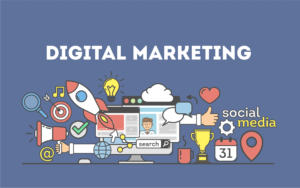Digital marketing for beginners has revolutionized the way businesses reach and engage with their audience. In today’s fast-paced, interconnected world, understanding the fundamentals of digital marketing is essential for anyone looking to promote their brand, products, or services. If you’re new to this exciting field, this guide will help you navigate the digital marketing for beginners landscape and set you on the path to success.

Chapter 1: What is Digital Marketing for beginners?
Digital marketing for beginners In this chapter, we’ll explore the basics of digital marketing, including its definition and significance in today’s business world. You’ll learn about the different digital channels and platforms that make up the digital marketing ecosystem.
Chapter 2: The Digital Marketing Funnel
Understanding the digital marketing funnel is crucial. We’ll explain the stages of the funnel – Awareness, Interest, Consideration, Conversion, and Loyalty – and how they relate to your customer’s journey.
Chapter 3: Building Your Online Presence
To succeed in digital marketing for beginners , you need a strong online presence. This chapter covers topics like creating a website, optimizing it for search engines (SEO), and developing a content strategy to attract and engage your target audience.
Chapter 4: Social Media Marketing
Learn how to leverage popular social media platforms like Facebook, Instagram, Twitter, and LinkedIn to connect with your audience. We’ll discuss the best practices for creating and promoting content, as well as the importance of engagement and analytics.
Chapter 5: Email Marketing
Email marketing is a powerful tool for reaching our audience. We’ll guide you through the process of building an email list, crafting compelling emails, and automating your email campaigns for maximum impact.digital marketing for beginners its mainly top content is email marketing.
Chapter 6: Paid Advertising in Digital marketing for Beginners
This chapter delves into paid advertising options, such as Google Ads and social media advertising. You’ll discover how to create and manage ad campaigns, set budgets, and monitor performance.paid advertising is common one in digital marketing for beginners.
Chapter 7: Content Marketing in Digital marketing for Beginners
Digital marketing for beginners is very highly influvensive one of the digital marketing world. We’ll discuss how to create valuable, relevant content that not only attracts your target audience but also builds brand authority and trust.
Chapter 8: Analytics and Data Insights
Effective digital marketing relies on data analysis. We’ll introduce you to various analytics tools and explain how to interpret data to make informed decisions and refine your strategies.
Chapter 9: Search Engine Optimization (SEO)
SEO is used to increase the visibility of your website in search engines. You’ll learn about on-page and off-page SEO techniques and best practices to enhance your site’s rankings.

Chapter 10: Mobile and Voice Search Optimization
With the rise of mobile and voice search, optimizing your digital presence for these platforms is crucial. Discover how to adapt your strategies for mobile and voice search to stay ahead.
Chapter 11: Digital Marketing for beginners and Trends
Digital marketing is a dynamic field with ever-evolving trends. In this chapter, we’ll explore the latest trends, such as video marketing, influencer partnerships, and the role of AI in marketing.
Chapter 12: Creating Your plan on digital marketing for beginners
at the digital marketing for beginners must have been a good digital marketing plan .Finally, you’ll learn how to create a comprehensive digital marketing plan that aligns with your business goals, audience, and budget.

- Target Audience Understanding: Start by defining your target audience. Who are your ideal customers, and what are their preferences and behaviors? The digital marketing efforts will be better when you understand our audience.
- Consistency is Key: Consistency in branding, messaging, and content is crucial. Maintain a uniform voice and visual identity across all digital channels.
- Content Quality Over Quantity: It’s not about how much content you produce, but the quality of the content. Well-researched, informative, and engaging content tends to perform better.
- Social Media Engagement: Engagement on social media is not just about posting content but actively interacting with your audience. Responding to comments and messages usually encourages discussions.
- Testing and Optimization: Frequently check the different strategies and tactics. A/B testing your emails, ad campaigns, and website elements can help you optimize your efforts.
- Data Privacy: Be aware of data privacy laws, such as GDPR and CCPA, and ensure that your digital marketing practices comply with these regulations.
- Content Calendar: make a content calendar to plan and schedule the content in advance. This helps maintain consistency and ensures you cover important events and holidays.
- Email List Building: Building a high-quality email list is invaluable for marketing. Use ethical methods to collect emails and provide value to your subscribers.
- Customer Reviews and Testimonials: ask satisfied customers to write reviews and testimonials. Positive reviews build trust and credibility.
- Community Building: Consider building an online community or forum related to your niche. Engaging with your community can boost loyalty and advocacy.
- Networking: Attend industry events, webinars, and forums to network with other digital marketers. Sharing your experiences and insights could be invaluable.
- Competitor Analysis: Keep an eye on your competitors. Analyze their strategies and see what you can learn from their successes and failures.
- Stay Informed: Digital marketing is always evolving. Stay updated with the latest industry news, trends, and algorithm changes on platforms like Google and social media.
- Budget Wisely: Allocate your budget based on the channels and strategies that perform best for your business. Do not overspend on tactics that don’t yield results.
- Patience: Digital marketing for beginners takes time to see results. Don’t get discouraged if you don’t see immediate success. Keep refining your strategies and be patient.
Remember, digital marketing for beginners is a dynamic field, and there’s no one-size-fits-all approach. What works best for your business might not work for another. The key is to be adaptive, continuously learn, and be willing to adjust your strategies as needed to achieve your marketing goals.

- Use Visual Content: Visual content, such as images and videos, can significantly boost engagement on social media and your website. Invest in creating high-quality visuals that resonate with your audience.
- Utilize Social Proof: Display social proof elements like the number of social media followers, user reviews, and ratings on your website. They can build trust and credibility.
- Learn from Analytics: Regularly analyze your website and social media analytics. Use these insights to understand what’s working and what’s not, then adjust your strategies accordingly.
- Build an Email Funnel: Develop an email marketing funnel that guides subscribers through the stages of awareness, consideration, and conversion. Personalized email sequences can be highly effective.
- Local SEO: If you have a physical presence or serve a specific geographic area, optimize your digital marketing for local search. This includes creating Google My Business profiles and local content.
- Use Remarketing: Implement remarketing campaigns to target people who have previously visited your website but didn’t convert. This can help re-engage potential customers.
- Content Distribution: Don’t just create content; ensure it reaches your audience. Promote your content on social media, and through email, and consider guest posting on relevant blogs.
- Mobile Optimization: With the increasing use of mobile devices, make sure your website and marketing materials are mobile-friendly. Google considers mobile-friendliness in their search rankings.
- Content Updates: Keep your older content up to date. Search engines favor fresh, relevant content, and updating your existing content can boost its visibility.
- Build an Online Reputation: Your online reputation matters. Encourage positive reviews and address negative feedback professionally and constructively.
- Consent and Privacy: Ensure you have consent before collecting any user data. Familiarize yourself with privacy regulations like GDPR and CCPA to avoid legal issues.
- Storytelling: Incorporate storytelling into your content and branding. People connect with stories, and they can make your brand more relatable and memorable.
- Educational Content: Offer informative and educational content that helps your audience solve problems or learn something new. This can position you as an authority in your industry.
- Content Variety: Diversify your content formats. Use blogs, videos, infographics, podcasts, and other types of content to cater to different audience preferences.
- Learn from Experts: Follow industry experts, attend webinars, and read books and blogs on digital marketing. Learning from those who have experience can accelerate your growth.
- Monitor Competitor Keywords: Tools like SEMrush and Ahrefs can help you identify the keywords your competitors are ranking for. This can give you insights into your keyword strategy.
- Stay Ethical: In all your digital marketing efforts, maintain ethical practices and avoid any black-hat SEO or deceptive tactics that could harm your reputation in the long run.

Digital marketing for Beginners is an exciting and ever-evolving field. The key to success is a combination of staying up-to-date with industry trends, experimenting with different strategies, and always putting the needs and interests of your target audience first.
Certainly digital marketing for beginners, here are a few more advanced tips for digital marketing for beginners who want to take their skills to the next level:
- Conversion Rate Optimization (CRO): Study CRO techniques to enhance the efficiency of your website and landing pages. Small changes, like adjusting the color of a CTA button or simplifying a form, can have a big impact on conversions. is the one of the tip of digital marketing for beginners.
- Marketing Automation: Explore marketing automation tools that can help you streamline your marketing efforts. These tools can assist in lead nurturing, personalized messaging, and automating routine tasks.
- User Experience (UX) Design: Understanding UX principles is essential. A well-designed website and user-friendly interfaces can significantly improve user engagement and conversions.
- Segmentation: Segment your audience for more targeted marketing. By categorizing your audience based on demographics, behavior, or other factors, you can send more personalized content.
- Long-Tail Keywords: Incorporate long-tail keywords in your SEO strategy. They are more specific and can help you target a niche audience with less competition.
- Video SEO: As video marketing grows, learn how to optimize your video content for search engines. This includes creating compelling video descriptions, using relevant tags, and adding transcriptions.
- at the digital marketing for beginners is also refers Structured Data Markup: Implement structured data markup (schema.org) on your website to help search engines understand your content better, potentially leading to rich snippets in search results.
- Link Building: Develop a comprehensive link-building strategy. Your website’s authority and search engine rankings can be boosted by High-quality backlinks from reputable websites.link building is a main of the digital marketing for beginners.
- Content Syndication: Syndicate your content on platforms like Medium, LinkedIn, or industry-specific websites to reach a wider audience. Be mindful of duplicate content issues and provide canonical links to your original content.
- Webinars and Workshops: Hosting webinars or workshops can position you as an industry expert and generate leads. You can Promote them through email marketing and social media.
- Content Personalization: Use data and user behavior to personalize content recommendations and product suggestions. Personalization can significantly improve user engagement and conversions.
- Voice Search Optimization: With the rise of voice-activated devices, optimize your content for voice search by targeting conversational keywords and providing concise, informative answers.
- AI and Chatbots: Explore the use of AI-driven chatbots for customer service and lead generation. Chatbots can offer 24/7 support and improve user experience.
- Blockchain and Digital Marketing: Stay informed about emerging technologies like blockchain, which may impact digital marketing by enhancing transparency and security in digital advertising.
- Networking and Collaboration: Collaborate with other businesses, influencers, or bloggers in your industry. These collaborations can expand your reach and credibility.it also includes in digital marketing for beginners.
- Data Analysis Tools: Invest in advanced data analysis tools like Google Analytics 360, Adobe Analytics, or custom analytics solutions to gain deeper insights into user behavior.
- A/B Testing: Continuously run A/B tests to fine-tune your digital marketing strategies. To find what works best test different elements of your campaigns.
- Learn from Mistakes: Not every campaign will be a success. Analyze your failures, learn from them, and use those lessons to improve your future efforts.
Remember, digital marketing for beginners is a dynamic field, and continuous learning is key to staying competitive. As you gain experience, these advanced techniques will become more valuable in refining your digital marketing strategy and achieving your goals.

Of course, here are some additional advanced Digital marketing for Beginners tips for those looking to further enhance their skills:
- Customer Lifetime Value (CLV): Calculate the CLV for your customers. This metric can help you make strategic decisions regarding customer acquisition and retention.
- Content Promotion: Develop a content promotion strategy that includes outreach to influencers and bloggers in your industry. Building relationships with key figures can amplify the reach of your content.
- In-Depth Competitor Analysis: Go beyond basic competitor research. Analyze your competitors’ marketing strategies, keyword targeting, and customer engagement in detail to identify gaps and opportunities.
- Advanced Email Marketing Automation: Implement complex email marketing automation workflows based on user behavior, segmentation, and lead scoring. Provide highly personalized content to your subscribers.
- Voice Search Skills: Explore natural language processing and optimization techniques to tailor your content for voice search. Consider creating voice-optimized content or skills for voice-activated devices like Alexa and Google Assistant.
- Artificial Intelligence (AI) Tools: Embrace AI-powered tools for data analysis, chatbots, and predictive analytics to streamline marketing efforts and provide personalized experiences.
- Predictive Analytics: Use predictive analytics to anticipate customer behavior, such as identifying potential leads and their likelihood to convert.
- Multichannel Attribution: Understand the customer journey across various touchpoints and channels. Implement multichannel attribution models to attribute conversions accurately.
- Social Listening: Utilize social listening tools to monitor and analyze online conversations about your brand, products, or industry. This can provide insights for real-time responses and marketing strategy adjustments.
- Advanced Paid Advertising Techniques: Experiment with advanced PPC techniques like dynamic keyword insertion, ad scheduling, and retargeting strategies to optimize your ad spend.
- Content Personalization Engines: Explore sophisticated content personalization engines that use machine learning to recommend content, products, and services to your users based on their past interactions.
- Advanced SEO Audits: Perform comprehensive SEO audits using professional tools to identify technical, on-page, and off-page SEO issues that may be affecting your website’s performance.
- Data Visualization: Learn data visualization techniques to present your marketing data clearly and compellingly, making it easier for stakeholders to understand and act upon.
- Blockchain and Advertising: Stay informed about how blockchain technology is being used in digital advertising to address issues such as ad fraud and transparency.
- Advanced Social Media Analytics: Dive deeper into social media analytics to understand the impact of your campaigns on audience sentiment, brand perception, and engagement.
- Conversion Funnel Optimization: Continuously optimize your conversion funnel by identifying bottlenecks and friction points that may hinder users from completing desired actions.
- Customer Retention Strategies: Develop sophisticated customer retention strategies, including loyalty programs, personalized re-engagement campaigns, and exclusive content or offers for existing customers.
- Data Privacy Compliance: Stay updated on data privacy regulations like the General Data Protection Regulation (GDPR) and the California Consumer Privacy Act (CCPA) to ensure compliance in your digital marketing activities.
- UX/UI Design Skills: Enhance your user experience (UX) and user interface (UI) design skills to create visually appealing, user-friendly websites and applications.
- Professional Certifications: Consider pursuing industry-recognized certifications in areas like Google Analytics, Google Ads, HubSpot, or digital marketing strategy to demonstrate your expertise.the digital marketing for beginners are very usefull the professionional certifications.
As you gain proficiency in these advanced digital marketing techniques, you’ll be better equipped to stay competitive in the ever-evolving digital landscape and drive more significant results for your marketing efforts.
Conclusion for Digital marketing for Beginners :
Digital marketing for beginners offers a world of opportunities and experienced marketers alike. By understanding the fundamentals covered in this guide, you can start your digital marketing journey with confidence. Remember that success in digital marketing requires ongoing learning and adaptation, so stay curious, stay creative, and keep experimenting to achieve your goals in this exciting field. Good luck!




